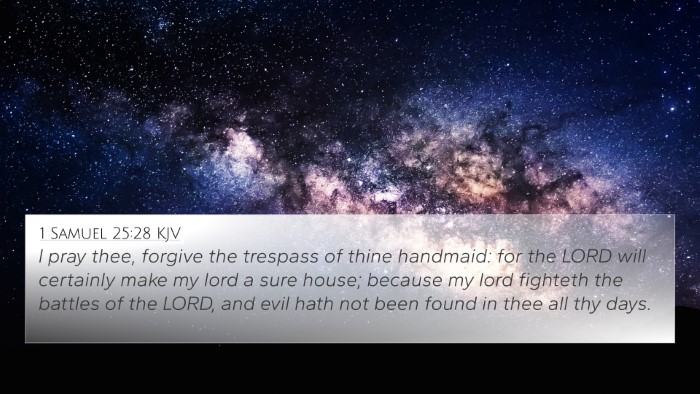Understanding Psalms 7:4
Psalms 7:4 presents a profound declaration of integrity and innocence in the face of accusation and oppression. This verse is part of David's plea to God amidst the attacks of his enemies. Below, we will explore the meaning of this verse and provide connections to other relevant scripture.
Verse Analysis
Psalms 7:4 (KJV): "If I have rewarded evil unto him that was at peace with me; yea, I have delivered him that without cause is mine enemy."
Meaning and Interpretation
In this verse, David asserts his righteousness by questioning the validity of the accusations against him. His emphasis on not rewarding evil and his commitment to delivering those who are without cause enemies of his highlights his moral stance.
Drawing on the insights of various commentaries:
- Matthew Henry: Henry emphasizes that David is appealing to God's justice, demonstrating that his actions have been just and that he has not betrayed those who have been peaceful towards him. The verse exemplifies the importance of maintaining integrity and righteousness in the face of adversities.
- Albert Barnes: Barnes points out that David’s innocence becomes a foundation for his appeal to God for deliverance. He remarks on the significance of acknowledging one’s own integrity when confronting unfair treatment, suggesting that it offers a profound parallel to God's justice and righteousness.
- Adam Clarke: Clarke notes the contrast between the character of David and that of his adversaries. He views David's commitment to being a man of peace as a central theme in this passage, illustrating the theme of divine justice that runs throughout the Psalms.
Thematic Connections
This verse connects to various biblical themes, particularly those relating to justice, integrity, and divine retribution. Below are Bible verse cross-references that provide deeper insights and highlight connections between Bible verses:
- Proverbs 17:13: "Whoso rewardeth evil for good, evil shall not depart from his house." - This verse parallels the theme of not repaying evil and underscores the importance of integrity.
- Psalm 18:20: "The LORD rewarded me according to my righteousness; according to the cleanness of my hands hath he recompensed me." - Reflects the idea of God recognizing and responding to personal integrity.
- Luke 6:31: "And as ye would that men should do to you, do ye also to them likewise." - This New Testament teaching aligns with David's emphasis on peace and righteousness.
- 2 Samuel 22:21: "The LORD rewarded me according to my righteousness: according to my cleanness in his eyesight." - Echoes the sentiments in Psalms 7:4 about divine justice.
- Matthew 5:11-12: "Blessed are ye, when men shall revile you, and persecute you, and shall say all manner of evil against you falsely, for my sake." - Links to the New Testament understanding of suffering for righteousness.
- Romans 12:19: "Dearly beloved, avenge not yourselves, but rather give place unto wrath: for it is written, Vengeance is mine; I will repay, saith the Lord." - A crucial connection highlighting divine justice rather than personal vengeance.
- James 5:6: "Ye have condemned and killed the just; and he doth not resist you." - This verse encourages reflection on justice and the treatment of the innocent.
Conclusion
In summary, Psalms 7:4 serves as a powerful reminder of the importance of remaining faithful and just even in the face of unfounded attacks. The cross-references to other scriptures provide a rich context that reinforces the themes of righteousness, integrity, and the significance of seeking God's justice.
For those interested in cross-referencing Biblical texts, exploring the connections between scripture offers tools for understanding deeper theological themes and inter-Biblical dialogues.
Utilizing a Bible concordance or a Bible cross-reference guide can greatly enhance your study and understanding of these connections and themes.

















